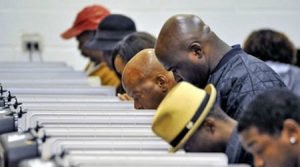(Akiit.com) The 15th Amendment to the Constitution of course meant that African American men were given the right to vote. It declared that the citizens of the United States shouldn’t be denied due to their race, color- great in theory but as we know it wasn’t all plain sailing from there. In fact, within ten years lots of discriminatory practices were being used to prevent African Americans from being able vote, this was especially evident in the South. Governments of these southern states essentially nullified the 14th and 15th Amendments, stripping black people in the South of the right to vote.
In the decades that followed, other discriminatory practices (including poll taxes and literacy tests) topped off with a good dose of intimidation and violence meant that many African Americans  weren’t able to exercise their right to vote. It wasn’t until years later in The Voting Rights Act of 1965 that all legal barriers at the state and local levels were overcome, and this created a significant change in the status of African Americans in the South. Previous to this, only an around a quarter of voting-age black people were registered nationally, but by 1969 the number had reached over sixty percent.
weren’t able to exercise their right to vote. It wasn’t until years later in The Voting Rights Act of 1965 that all legal barriers at the state and local levels were overcome, and this created a significant change in the status of African Americans in the South. Previous to this, only an around a quarter of voting-age black people were registered nationally, but by 1969 the number had reached over sixty percent.
Many passionate Americans who wanted equality protested and marched for these rights. Many were arrested and even killed when working towards equality in voting. Martin Luther King Jr. famously brought hundreds of black people to a courthouse in Alabama to register, and when they were refused, he organized and led protests that finally turned the tables when it came to American political opinion. Today, the Congressional Black Caucus has a record forty eight members, which many say they’re fighting some of the same battles that the group’s founders fought nearly fifty years ago.
When Donald Trump was made president in December, he stated that ‘states should have tighter voter identification laws’. What this can mean in theory is a huge step back from African American voting (as well as other minorities) since it can encourage those who want to continue denying them. Many caucus members actually boycotted Trump’s swearing-in last January as a result of this, and rejected a second invitation to meet with him a few months later- due to its concerns falling ‘on deaf ears’ the first time around.
Trump is said to have members of his cabinet who don’t support voting rights, and so the issue of African American voting is unfortunately as rife today as it was all of those years ago. For now, groups such as The Caucus, protesters and equal rights advocates continue to fight the battle for justice and equality. Technology such as Smartmatic that can electronically process votes for fraud free elections can also be useful in winning the battle against inequality.
We are all humans, each of us is equal and we all deserve to have our voices heard- regardless of gender, sexual identity, religion or race. From gender pay gaps to racism, homophobia and more- we know too well that many of us aren’t currently treated equally. Let’s do what we can to stop that, being able to vote and everyone being able to have their voice heard is one step towards it.
Staff Writer; Phil Shaw








Leave a Reply